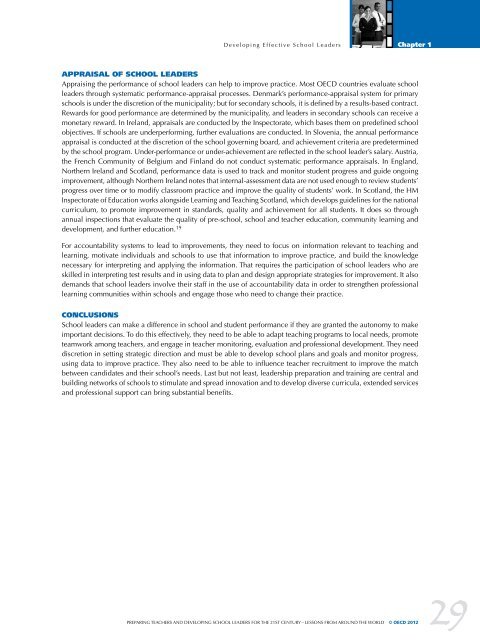Preparing Teachers and Developing School Leaders for the 21st Century
Preparing Teachers and Developing School Leaders for the 21st Century
Preparing Teachers and Developing School Leaders for the 21st Century
You also want an ePaper? Increase the reach of your titles
YUMPU automatically turns print PDFs into web optimized ePapers that Google loves.
developing effective school leaders<br />
Chapter 1<br />
ApprAIsAl oF sChool leAders<br />
appraising <strong>the</strong> per<strong>for</strong>mance of school leaders can help to improve practice. Most oecd countries evaluate school<br />
leaders through systematic per<strong>for</strong>mance-appraisal processes. Denmark’s per<strong>for</strong>mance-appraisal system <strong>for</strong> primary<br />
schools is under <strong>the</strong> discretion of <strong>the</strong> municipality; but <strong>for</strong> secondary schools, it is defined by a results-based contract.<br />
rewards <strong>for</strong> good per<strong>for</strong>mance are determined by <strong>the</strong> municipality, <strong>and</strong> leaders in secondary schools can receive a<br />
monetary reward. in irel<strong>and</strong>, appraisals are conducted by <strong>the</strong> inspectorate, which bases <strong>the</strong>m on predefined school<br />
objectives. if schools are underper<strong>for</strong>ming, fur<strong>the</strong>r evaluations are conducted. in slovenia, <strong>the</strong> annual per<strong>for</strong>mance<br />
appraisal is conducted at <strong>the</strong> discretion of <strong>the</strong> school governing board, <strong>and</strong> achievement criteria are predetermined<br />
by <strong>the</strong> school program. Under-per<strong>for</strong>mance or under-achievement are reflected in <strong>the</strong> school leader’s salary. Austria,<br />
<strong>the</strong> french community of Belgium <strong>and</strong> finl<strong>and</strong> do not conduct systematic per<strong>for</strong>mance appraisals. in engl<strong>and</strong>,<br />
nor<strong>the</strong>rn irel<strong>and</strong> <strong>and</strong> scotl<strong>and</strong>, per<strong>for</strong>mance data is used to track <strong>and</strong> monitor student progress <strong>and</strong> guide ongoing<br />
improvement, although Nor<strong>the</strong>rn Irel<strong>and</strong> notes that internal-assessment data are not used enough to review students’<br />
progress over time or to modify classroom practice <strong>and</strong> improve <strong>the</strong> quality of students’ work. In Scotl<strong>and</strong>, <strong>the</strong> HM<br />
inspectorate of education works alongside learning <strong>and</strong> teaching scotl<strong>and</strong>, which develops guidelines <strong>for</strong> <strong>the</strong> national<br />
curriculum, to promote improvement in st<strong>and</strong>ards, quality <strong>and</strong> achievement <strong>for</strong> all students. it does so through<br />
annual inspections that evaluate <strong>the</strong> quality of pre-school, school <strong>and</strong> teacher education, community learning <strong>and</strong><br />
development, <strong>and</strong> fur<strong>the</strong>r education. 19<br />
<strong>for</strong> accountability systems to lead to improvements, <strong>the</strong>y need to focus on in<strong>for</strong>mation relevant to teaching <strong>and</strong><br />
learning, motivate individuals <strong>and</strong> schools to use that in<strong>for</strong>mation to improve practice, <strong>and</strong> build <strong>the</strong> knowledge<br />
necessary <strong>for</strong> interpreting <strong>and</strong> applying <strong>the</strong> in<strong>for</strong>mation. that requires <strong>the</strong> participation of school leaders who are<br />
skilled in interpreting test results <strong>and</strong> in using data to plan <strong>and</strong> design appropriate strategies <strong>for</strong> improvement. it also<br />
dem<strong>and</strong>s that school leaders involve <strong>the</strong>ir staff in <strong>the</strong> use of accountability data in order to streng<strong>the</strong>n professional<br />
learning communities within schools <strong>and</strong> engage those who need to change <strong>the</strong>ir practice.<br />
ConClusIons<br />
school leaders can make a difference in school <strong>and</strong> student per<strong>for</strong>mance if <strong>the</strong>y are granted <strong>the</strong> autonomy to make<br />
important decisions. to do this effectively, <strong>the</strong>y need to be able to adapt teaching programs to local needs, promote<br />
teamwork among teachers, <strong>and</strong> engage in teacher monitoring, evaluation <strong>and</strong> professional development. <strong>the</strong>y need<br />
discretion in setting strategic direction <strong>and</strong> must be able to develop school plans <strong>and</strong> goals <strong>and</strong> monitor progress,<br />
using data to improve practice. <strong>the</strong>y also need to be able to influence teacher recruitment to improve <strong>the</strong> match<br />
between c<strong>and</strong>idates <strong>and</strong> <strong>the</strong>ir school’s needs. Last but not least, leadership preparation <strong>and</strong> training are central <strong>and</strong><br />
building networks of schools to stimulate <strong>and</strong> spread innovation <strong>and</strong> to develop diverse curricula, extended services<br />
<strong>and</strong> professional support can bring substantial benefits.<br />
PreParing teachers <strong>and</strong> develoPing school leaders <strong>for</strong> <strong>the</strong> <strong>21st</strong> century – lessons froM around <strong>the</strong> World © OECD 2012<br />
29


